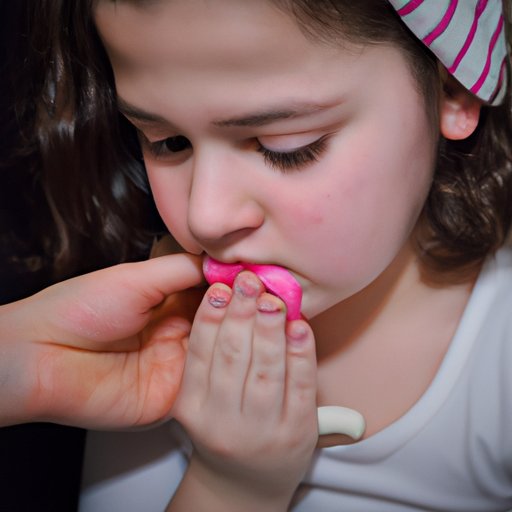
Overview of Hand Foot Mouth Disease
Hand foot mouth disease is a viral illness that commonly affects infants and young children, although it can also occur in adults. It is caused by the Enterovirus, which spreads through contact with the feces, saliva, and nasal discharge of an infected person. The illness is usually not a cause for concern and resolves on its own within 7-10 days. However, it can cause discomfort and lead to complications in some cases.
Causes of Hand Foot Mouth Disease
As mentioned earlier, hand foot mouth disease is caused by the Enterovirus, specifically the Coxsackie virus. The virus is highly contagious and can spread easily through close contact with an infected person. Transmission can occur through direct contact with infected bodily fluids, such as saliva or nasal mucus, or through coming into contact with contaminated surfaces.
Symptoms of Hand Foot Mouth Disease
The symptoms of hand foot mouth disease usually appear 3-7 days after exposure to the virus. The most common symptoms include:
- Fever
- Sore throat
- Loss of appetite
- Headache
- Vomiting/Diarrhea
- Painful sores in the mouth, on the tongue, and on the inside of the cheeks
- Red rash on palms of the hands, soles of the feet, and sometimes on the buttocks and genitals (in infants)
It is important to note that not everyone infected with the Enterovirus will develop hand foot mouth disease, and some people may only experience mild symptoms.
How Hand Foot Mouth Disease Spreads: Prevention and Control
As previously mentioned, hand foot mouth disease spreads through contact with bodily fluids and contaminated surfaces. It is important to take certain precautions to control the spread of the virus, particularly in healthcare facilities and schools.
Here are some methods of preventing and controlling the spread of hand foot mouth disease:
- Wash hands frequently and thoroughly for at least 20 seconds with soap and water
- Avoid close contact with those who are infected
- Cover mouth and nose with a tissue when coughing or sneezing
- Sanitize surfaces and objects that may be contaminated with the virus
It is important to note that those who have had hand foot mouth disease can still transmit the virus for several weeks after their symptoms have cleared.
The Importance of Hand Hygiene to Prevent Hand Foot Mouth Disease
Proper hand hygiene is crucial in preventing the spread of hand foot mouth disease. Washing hands often and using proper techniques is essential in maintaining good hand hygiene.
Here are some tips for proper hand washing techniques:
- Wet hands with clean water and apply soap
- Rub hands together for at least 20 seconds, making sure to wash the backs of hands, between fingers, and under nails
- Rinse hands thoroughly with clean water
- Dry hands with a clean towel or air dry them
In addition to proper hand washing techniques, it is important to maintain good hygiene habits, such as avoiding touching one’s face and keeping surfaces clean to prevent the spread of infection.
Foods to Eat (And Avoid) When You Have Hand Foot Mouth Disease
During an illness, it is important to provide the body with proper nutrition to promote healing and recovery. Here are some suggested foods that are beneficial for those with hand foot mouth disease:
- Soft, easy-to-swallow foods, such as oatmeal, mashed potatoes, and yogurt
- Cold foods, such as popsicles, applesauce, and fruit smoothies to soothe mouth sores
- Fluids, such as water, juice, broth, and electrolyte drinks to prevent dehydration
It is also important to avoid certain foods that can irritate mouth sores, such as spicy and acidic foods. Hard and crunchy foods, such as chips and crackers, should also be avoided as they may cause discomfort and pain.
When to See a Doctor for Hand Foot Mouth Disease
Most cases of hand foot mouth disease are not severe and will resolve on their own within 7-10 days. However, in some cases, medical attention may be necessary. Here are some indications that medical attention may be necessary:
- Fever lasting more than 3 or 4 days
- Severe throat pain or difficulty swallowing
- Dehydration
- Signs of infection, such as redness, warmth, or swelling around sores or blisters
Prior to seeking medical attention, it is important to care for oneself at home by getting plenty of rest, staying hydrated, and taking over-the-counter medications to reduce fever and pain if necessary.
Common Misconceptions About Hand Foot Mouth Disease
There are many common misunderstandings about hand foot mouth disease. Here are some misconceptions and the accurate information to dispel them:
- Myth: Hand foot mouth disease is only a childhood illness.
- Fact: While hand foot mouth disease is more common in children, it can occur in adults as well.
- Myth: Once you’ve had hand foot mouth disease, you are immune for life.
- Fact: There are many strains of the enterovirus that cause hand foot mouth disease, and immunity after infection with one strain does not protect against another strain.
- Myth: Hand foot mouth disease can only be caught from someone who is showing symptoms.
- Fact: The virus can be transmitted by someone who is not showing symptoms.

How to Care for a Child with Hand Foot Mouth Disease
Caring for a child with hand foot mouth disease may require a bit of extra attention and care. Here are some practical tips for parents or guardians:
- Keep the child hydrated by offering frequent fluids and popsicles
- Provide soft, easy-to-swallow foods and avoid hard and crunchy foods
- Offer over-the-counter pain relievers to reduce fever and pain if necessary
- Keep the child comfortable by dressing them in loose, breathable clothing and keeping the room at a comfortable temperature
With proper care and attention, most children will recover from hand foot mouth disease without complications.




